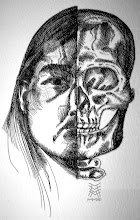The best quality to possess is concentration. The ability to concentrate for long hours, uninterrupted is the the top, essential skill to harness.
If you want to learn from me, show up to my doorstep every morning for 3 years than I will take you seriously.
Good concentration is a spiritual quality. I learned concentration habits from Chinese Tao, and Buddhist Meditation principles. Although I personally am not the type of person to sit still motionless, I take those habits of meditation and apply them to artistic production.
You have to be content with yourself. Time should not be a factor. It shouldn't matter if its a Friday night, or Saturday night, you should be able to get over urges and be content with yourself.
Concentration is a spiritual learning process. When you are alone, quiet and focused, you will hear your thoughts. You will become closer to yourself, and be able to accept yourself for everything.
Concentration will bring you peace and forgiveness. Listen to yourself. Concentration will unveil many aspects that are important to your consciousness and give you ever lasting ideas.
Concentrate on becoming a great master artist. Learn from master artists. Invest great amounts of time in honing your talent to be that of master quality. Pick a challenge for yourself, and strive to become one with the master.
Feel like the master, like the way you enjoy good song and dance, or sex, give your inner focus to the appreciation of the act of making art. Make the art come from your inner breath. Communicate your everything, your total person, all your life into the life of your line quality.
Understand art as pleasurable. Become deeply moved by drawing and painting. See deeply into visual experience. See deeply into art as a product of the inner theater of the mind.
Strive to produce art that is one with your mind. Set your mind free and imagine strongly your vision before you draw it. See it on the page before you draw it.
I'm talking about art the way I set out to do. If you respect and choose to do art the way I do, than apply this knowledge for the benefit of yourself, because I am here to tell you how I have found and harnessed my artistic potential. This is my philosophy that I taught myself, through research and discipline, and practice.
Practice until your hand hurts.
Set your own goals. My goal from the very beginning when I set out to achieve mastery, or some semblance of it, was to draw what I see, within my mind or elsewhere, to draw that with efficiency. I wanted to eliminate sketching from my process, and draw perfectly. My goal was to clean my drawing skills so that I could produce polished work all the time. I don't want to have to sketch the eyes over and over, or sketch the hands over and over, or mess up over and over.
I don't want to mess up. Granted, mistakes will be made, and some mistakes are beneficial. But my goal was to have immediate gratification with my mind through my artistic tool. I want to bring out whatever is within me, or what my artistic mind desires to have be done.
I started seriously practicing art on my own, studying the Chinese masters brush technique, at the age of around 19, 20. I practiced with extreme diligence, becoming reclusive and introverted for more than a year. I would draw in the Chinese brush method for as many hours as I could. I worked, concentrated with unrelenting passion. I was a man on a mission.
The idea was to draw so much, and gain so much experience in a short amount of time so that I could have master artist capacities at a young age, relative speaking. I wanted to in a few short years be on par with my art heroes.
So I modeled myself after my master teachers from hundreds of years ago. getting lessons in viewing all the art I could find of them. From a doodle, to a study, to journal writings, to accounts of contemporaries of the artist, and scholarly studies, I wanted to learn what it takes.
Concentration, serious dedication, research, extraordinary practice, goal oriented, and commitment are the fundamentals of harnessing artistic ability.
Next time I will get into the philosophical aspects of artistic practice.
Do You Save Emails?
16 years ago

No comments:
Post a Comment